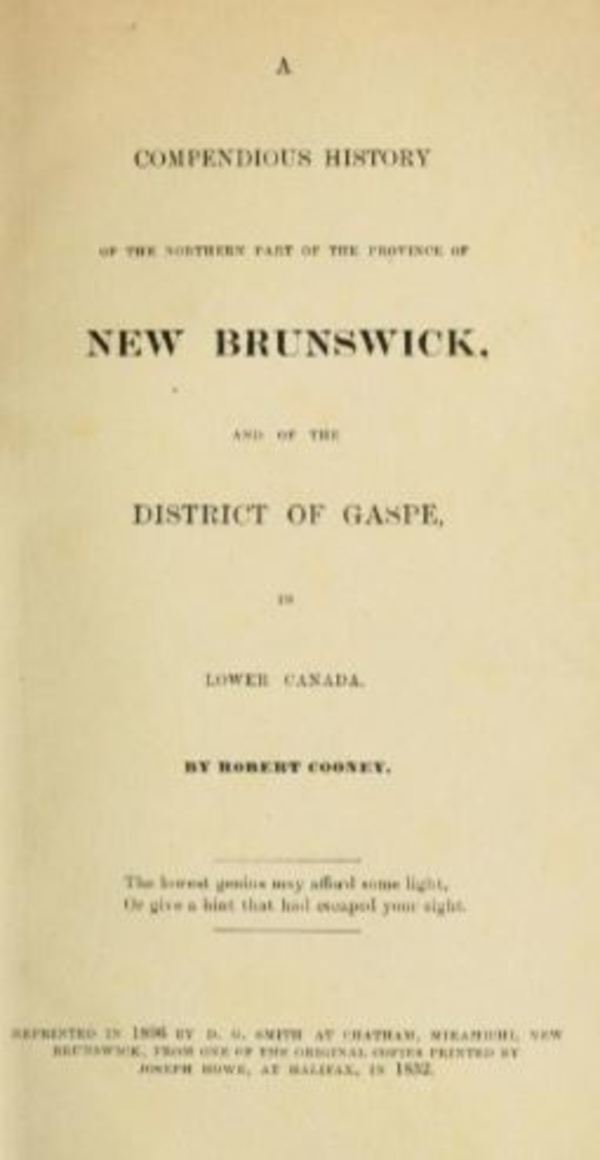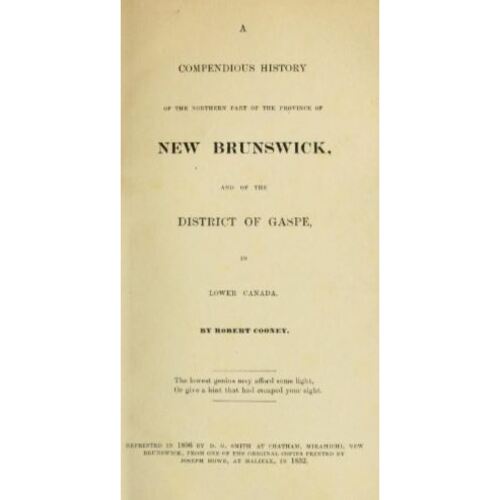
Source: Link
COONEY, ROBERT, Methodist clergyman, journalist, and author; b. 24 June 1800 in Dublin (Republic of Ireland); m. in 1837 Susan Catherine Shaw of Halifax; d. 17 March 1870 in Toronto, Ont.
Robert Cooney’s father was a clerk in a Dublin mercantile firm and was described by Robert as “well to do, and very respectably connected.” An Irish Gael and a Roman Catholic, he had married a girl who was Anglo-Irish and Church of England but who was converted to Catholicism and became a strong adherent. With her encouragement Robert Cooney began studies for the priesthood. The young Cooney was inspired not only by the priests who frequented his home, but also by Irish political leaders such as Daniel O’Connell, whom he frequently saw at mass.
In 1824, six years after the death of his father, Cooney abandoned his studies, immigrated to New Brunswick, and found employment in a Newcastle mercantile firm. He also found support for his ambitions for the priesthood in the person of the Reverend William Dollard*, later the first Roman Catholic bishop of Fredericton, under whom he renewed his theological studies. Cooney often accompanied Dollard on his pastoral rounds.
For a brief period Cooney worked for an unnamed barrister, who apparently had a great influence on him, but the real turning point in his life came in 1828. In the elections of that year, Cooney was asked, as an educated Irish Catholic, to help deliver the decisive Catholic vote to Joseph Cunard, the timber and shipping baron of the Miramichi, even though it was well known that Bishop Angus MacEachern* supported Cunard’s Catholic opponent, James DeWolf Fraser. Cooney agreed to support Cunard because he considered him more “liberal” than Fraser. Cunard received the critical Irish vote and was elected. Bishop MacEachern retaliated by having Cooney “read from the altar.” To protest this “alliance of Scots” and “Jesuitism,” Cooney left the Catholic Church.
Between 1829 and 1831, Cooney wrote for the Gleaner at Chatham, and gathered notes for his best known work, A compendious history of the northern part of the province of New Brunswick and of the district of Gaspé, in Lower Canada, which he dedicated to Cunard. In 1832 he took his manuscript to Halifax for publication by Joseph Howe*. During his visit to that town, Cooney was converted to Methodism, and soon began preaching. He was stationed in the next few years at Murray Harbour, P.E.I., and Liverpool, Halifax, and Guysborough, N.S., and was ordained in 1837. The next year he was transferred to Odelltown, Lower Canada, where he opposed the uprising which occurred in that town in 1838. After serving in Stanstead and Montreal in Canada East and Toronto in Canada West, he returned to New Brunswick in 1847, and preached at Carleton, Saint John, and St Stephen.
He was an extremely popular lecturer in the Saint John Mechanics’ Institute, and during the early 1850s he prepared a rambling apologia, The autobiography of a Wesleyan Methodist missionary. Not as well known as his History, Cooney’s autobiography is perhaps the more important work. It includes lengthy discussions of theological questions and defences of the Methodist Church, as well as observations on people and places encountered during Cooney’s itinerant ministry, although, as a modern commentator has noted, it is “irritatingly skimpy when touching on important events of which he was a witness.” Cooney discusses both the nature of his times and the difficulties faced by a cultivated and talented young man from Georgian Dublin in adjusting to the brutal realities of backwoods New Brunswick. The Catholicism which had inspired his youth was not the Catholicism he found struggling for survival in the Miramichi. If he resented the Highland hegemony of Bishop MacEachern, he had also discovered, perhaps for the first time, that all Irishmen were not the equal of O’Connell.
Cooney left New Brunswick in 1855, and after a brief stay at Saint-Jean in Canada East, moved on to preach in Canada West at Guelph (1856–57), London (1858–59), and St Catharines (1860–61). There he lived in retirement from 1862 to 1868 when he returned to Toronto. Although he continued to write and lecture, he became more interested in theological questions. Cooney was apparently a well-respected minister within his church; by 1858 two universities had honoured him with degrees. His death in 1870 went almost unnoticed in New Brunswick, but in 1896 his History was republished in Chatham, N.B., and Cooney’s memory reaped the reward he deserved as an observer and recorder of history.
[Robert Cooney], The autobiography of a Wesleyan Methodist missionary, (formerly a Roman Catholic), containing an account of his conversion from Romanism, and his reception into the Wesleyan ministry; also reminiscences of nearly twenty-five years’ itinerancy in the North American provinces . . . (Montreal, 1856); A compendious history of the northern part of the province of New Brunswick and of the district of Gaspé, in Lower Canada (Halifax, 1832; repr. Chatham, N.B., 1896). Wesleyan Methodist Church in Can., Minutes (Toronto), 1870. Christian Guardian, 23 March 1870. Gleaner (Chatham, N.B.), 1829–31. Morning News (Saint John, N.B.), 1853–57. New Brunswick Courier, 1 July 1837. St. John Daily Telegraph and Morning Journal (Saint John, N.B.), 29 March 1870. Cornish, Cyclopaedia of Methodism. Morgan, Bibliotheca Canadensis. Story, Oxford companion. T. W. Smith, History of the Methodist Church within the territories embraced in the late conference of Eastern British America . . . (2v., Halifax, 1877–90). W. O. Raymond, “Robert Cooney, first historian of northern and eastern New Brunswick,” N.B. Hist. Soc., Coll. (Saint John), no.10 (1919), 67–85.
Cite This Article
P. M. Toner, “COONEY, ROBERT,” in Dictionary of Canadian Biography, vol. 9, University of Toronto/Université Laval, 2003–, accessed February 27, 2026, https://www.biographi.ca/en/bio/cooney_robert_9E.html.
The citation above shows the format for footnotes and endnotes according to the Chicago manual of style (16th edition). Information to be used in other citation formats:
| Permalink: | https://www.biographi.ca/en/bio/cooney_robert_9E.html |
| Author of Article: | P. M. Toner |
| Title of Article: | COONEY, ROBERT |
| Publication Name: | Dictionary of Canadian Biography, vol. 9 |
| Publisher: | University of Toronto/Université Laval |
| Year of publication: | 1976 |
| Year of revision: | 1976 |
| Access Date: | February 27, 2026 |



